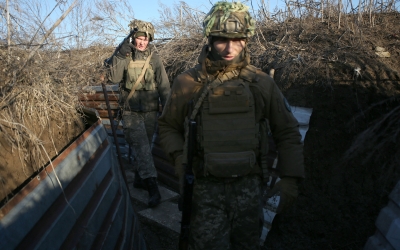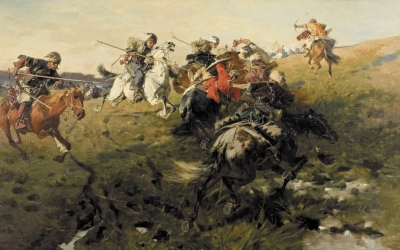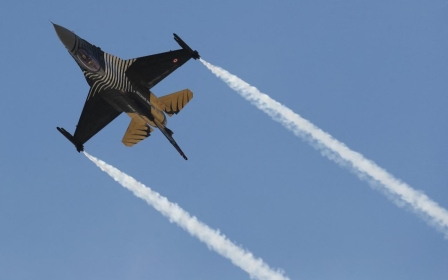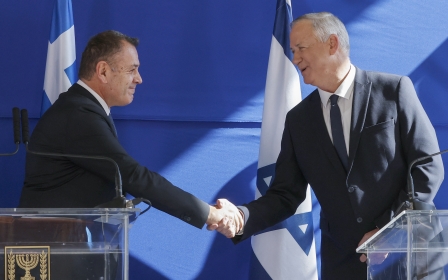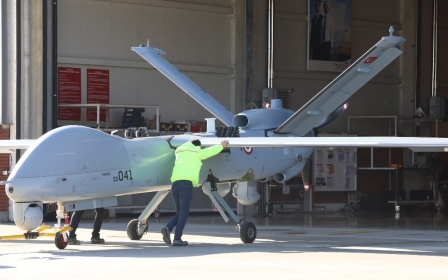Turkey was Nato's wayward member, then came the crisis in Ukraine
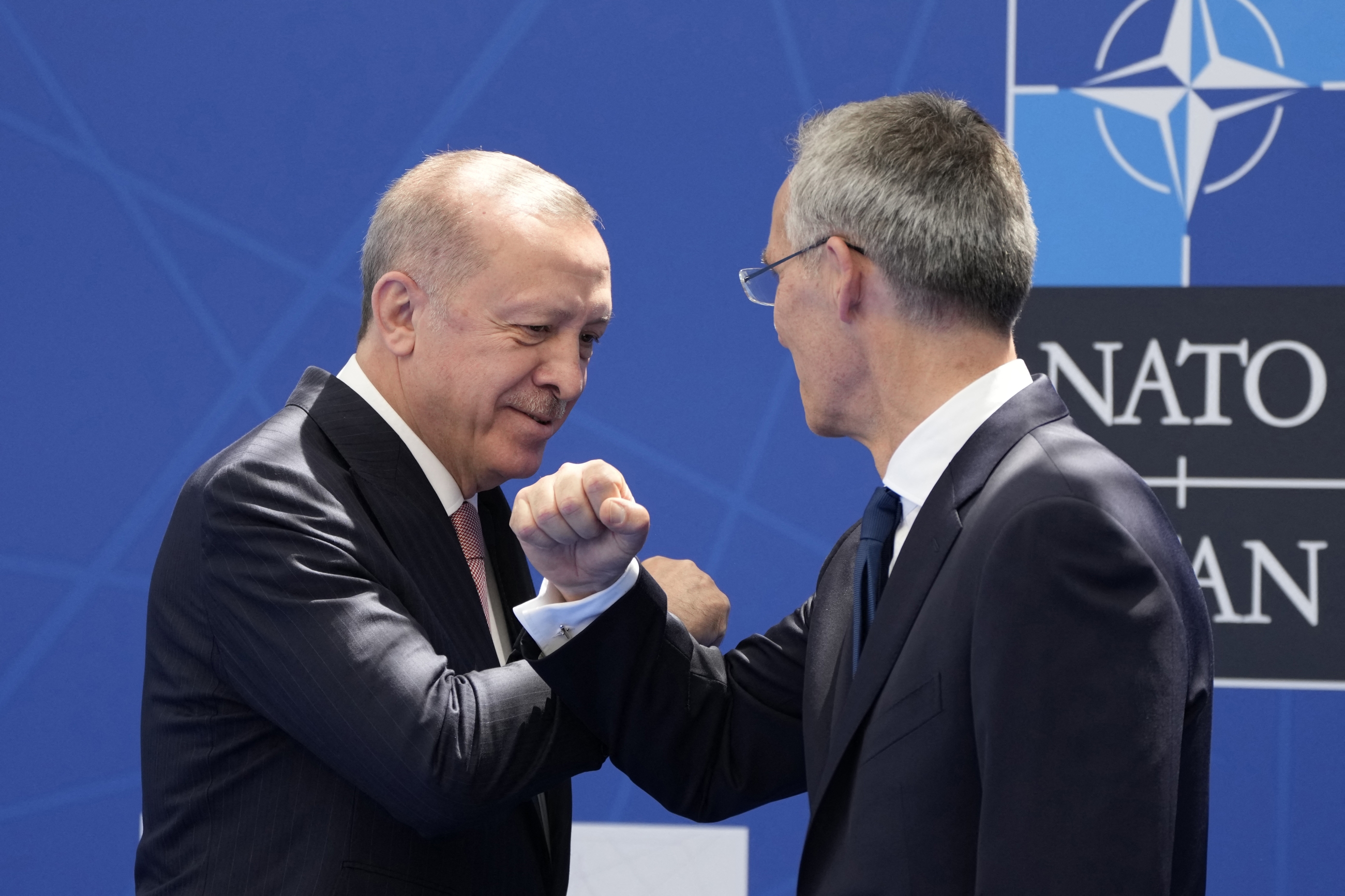
Nato has for years been plagued by tensions between Turkey and fellow member states, but with the looming threat of a Russian invasion of Ukraine, Ankara has recently found greater cohesion with its alliance partners.
Turkish President Recep Tayyip Erdogan said on Wednesday there "should be no doubt" about his country honouring "its commitments as a Nato ally".
Like other countries in the region, Turkey has been watching the crisis along its Black Sea neighbour's borders carefully.
Last week Erdogan tried to dissuade Russia from launching an invasion, stating: "Ukraine is not an ordinary country. Ukraine is a strong country." He offered to moderate between Kiev and Moscow and plans to visit Ukraine on 3 Febuary.
'You can see some elements of tension between countries in Europe [over Ukraine], but Turkey hasn't been one of those actors'
- European Nato official
"Turkey is showing itself to be a credible and important ally [during this crisis]," a European Nato official told Middle East Eye on condition of anonymity when discussing the sensitive topic.
New MEE newsletter: Jerusalem Dispatch
Sign up to get the latest insights and analysis on Israel-Palestine, alongside Turkey Unpacked and other MEE newsletters
Critics have long argued that, under Erdogan, the country with the second-largest army in Nato was drifting away, perhaps irrevocably, from the alliance.
Turkey was censured in the West for launching its own invasions into Syria. It clashed openly with Nato allies Greece and France in the Eastern Mediterranean, and has drawn criticism for a crackdown on dissent at home.
The fallout was exacerbated by Erdogan's overtures to Russian President Vladimir Putin and the purchase of Russia's S-400 missile system. That move triggered Turkey's ejection from the US flagship F-35 fighter jet programme and the subsequent imposition of sanctions by Washington.
"Sanctions are imposed on our country, a Nato member," Erdogan bemoaned last year following the announcement. "What kind of an alliance is this?"
Hardcore Nato business
Beneath the simmering feuds, Ankara, in large part driven by its own security concerns, has emerged as a key backer of the pro-West government in Kiev.
Erdogan has met his Ukrainian counterpart, Volodymyr Zelensky, at least five times since 2019. Zelensky has met no other leader as frequently. Erdogan has also committed publicly to Ukraine's territorial integrity and resisted Russian appeals to recognise the annexation of Crimea.
"The Turks haven't backed off on their unwavering support for Ukraine, even though it's clear Russia hasn't been happy with that," Stephen Flanagan, a senior political scientist with Rand, told MEE.
"If anything, they have been among those countries most supportive."
In 2019, to the fury of Russia, Turkey began selling armed drones to Ukraine. The country subsequently deployed them in a precision strike against Russian-backed separatists in October. Plans to build a factory to produce the Bayraktar TB2 drones in Ukraine are underway.
As Russian troops, now estimated at around 120,000, continue to mount near Ukraine's border, more Nato members have increased military assistance.
Estonia is sending Javelin anti-tank missiles, and fellow Baltic countries Latvia and Lithuania are providing Stinger anti-aircraft missiles.
The Biden administration released an additional $200m in security assistance for Ukraine last week, and Washington's military aid has been augmented by a UK airlift of more than 2,000 short-range anti-tank missiles to the country.
James Jeffrey, a former US ambassador to Turkey currently with the Wilson Center think-tank in Washington DC, said the White House was working quietly with Turkey at both bilateral and Nato levels.
"Both Washington and Nato recognise the key role Turkey has been playing in the Ukraine crisis but fear of a sudden Erdogan 'flip' limits public acknowledgement," he said.
So far the greatest challenge to Nato's efforts to show a united front appear to be coming from the West, not the East.
President Emmanuel Macron of France, who has sparred repeatedly with Erdogan, was set to hold a call with Russian leader Vladimir Putin on Friday. His remarks about Europe charting a separate policy on Russia have unsettled Nato members close to Ukraine.
At the same time, Germany has been criticised for not staking out a clear position on the Nord Stream 2 pipeline, which would transport Russian gas to Europe and bypass Ukraine. It has also broken with other Nato members by refusing to export lethal weapons to Kiev.
"You can see some elements of tension between countries in Europe [over Ukraine], but Turkey hasn’t been one of those actors," the Nato official said.
"[While] it doesn't shy away from publicly presenting differences it might have with alliance members, when it comes to the hardcore part of Nato business, Turkey has not been a stumbling block," the official added.
Russian lake
Turkey and Russia are on opposing sides in conflicts in Syria and Libya, yet they have formed an uneasy partnership to manage their differences. "Turkey is in this balancing act between Russia and the West," Rand's Flanagan said.
One area where Turkey has watched Russia with particular wariness is in the Black Sea, where Moscow has emerged as the dominant power following its annexation of Crimea.
Russia's Black Sea naval fleet, stationed on the peninsula, has ballooned in recent years. It includes submarines and warships with Kalibr cruise missiles capable of hitting targets 2,400km (1,500 miles) away, and state-of-the-art intelligence-gathering ships.
The militarisation of Crimea has had a deep impact on Ankara's strategic thinking towards Nato.
"Before 2014 Turkey would say 'we don't need Nato here. We can take care of it'," Mamuka Tsereteli, a scholar with the Middle East Institute's Frontier Europe Initiative, told MEE.
"Now they are more willing to allow a greater Nato presence in the Black Sea than at any other time in decades," he said.
In 2016, Erdogan gave a speech in which he warned the Black Sea was becoming a "Russian lake" and cautioned, "if we do not take action, history will not forgive us".
Turkey has also positioned itself as a staunch advocate of both Ukraine and Georgia's admission into Nato. It is also a participant in naval exercises with fellow Black Sea Nato countries including Romania and Bulgaria.
Still, with the prospect of war rising in recent weeks, Erdogan has measured some of his rhetoric. In an interview on Wednsday he called for dialogue "that will listen to Russia and eliminate their reasonable security concerns".
The Turkish leader's offer to serve as a mediator also suggests he is eager to tap into the relationship he has developed with Putin and perhaps strike a more neutral tone.
"We work closely with the US within Nato," a Turkish official told MEE. But the country's ventures into overseas hotspots also mean it is constantly rubbing up against Russia, and treads carefully.
"Turkey puts a premium on talking with Russia," the Nato official said.
There are limits to how far cohesion on Ukraine has gone, and stumbling blocks in Turkey's relationship with the West persist. Despite its muscular support for Kiev, there is scant evidence Ankara is willing to back down on one of its most contentious moves: the S-400 purchase.
"Turkey fulfills all of its obligations as a Nato member, but by the narrow confines of [the Nato treaty] it can do a lot in terms of its own defence and national policy," the official said. "Turkey looks at its role differently."
Middle East Eye delivers independent and unrivalled coverage and analysis of the Middle East, North Africa and beyond. To learn more about republishing this content and the associated fees, please fill out this form. More about MEE can be found here.


